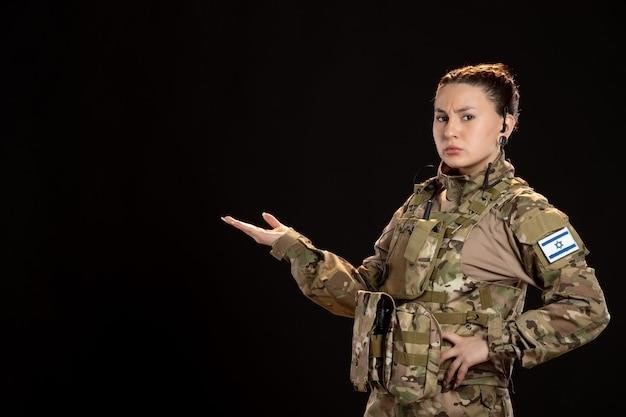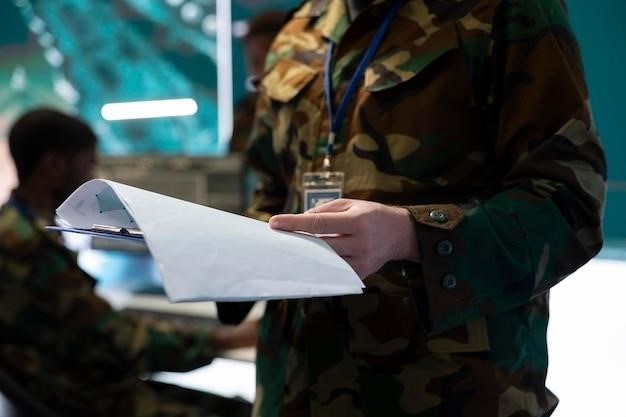
The Army NCO Guide⁚ A Comprehensive Overview
This guide provides a thorough examination of the Non-Commissioned Officer (NCO) role within the US Army, encompassing responsibilities, training, leadership, and professional development․ It covers key changes in the 2020 edition of FM 7-22;7 and its alignment with NCO Common Core Competencies․
The Non-Commissioned Officer (NCO) serves as the backbone of the U․S․ Army, a crucial link between enlisted personnel and commissioned officers․ NCOs are responsible for the training, discipline, and well-being of their soldiers․ This pivotal role demands a unique blend of technical expertise, leadership skills, and mentorship capabilities․ They are the primary trainers and mentors, ensuring unit readiness and proficiency․ NCOs are entrusted with upholding Army values, fostering a positive unit climate, and maintaining high standards of conduct․ Their influence extends beyond tactical operations, impacting soldier morale, career progression, and overall unit cohesion․ The NCO corps is structured as a hierarchical system, with various ranks and responsibilities, each contributing to the effective functioning of the Army․ They are the primary implementers of Army policy and doctrine at the unit level, ensuring that orders are understood, training is effective, and standards are met․ The NCO’s role is multifaceted and essential to the success of any Army unit, from the squad to the brigade level․
The NCO’s Five Core Responsibilities
The Army NCO’s role is multifaceted, but five core responsibilities consistently emerge as paramount․ First, military training is central; NCOs are responsible for ensuring their soldiers receive the necessary instruction and practical experience to excel in their roles․ Second, practical leadership is key; NCOs must lead by example, motivate their teams, and make sound decisions under pressure․ Third, role modeling is crucial; NCOs embody Army values and standards, setting the tone for their units․ Fourth, unit standards are maintained through consistent oversight and enforcement of regulations, contributing to discipline and cohesion․ Finally, mentoring plays a vital role; NCOs guide and support their soldiers’ professional and personal growth, fostering a positive and supportive environment․ These five responsibilities are interconnected and essential for building effective and successful Army units․ The effective execution of these core responsibilities is critical to Army readiness and success․
Military Training and Development
Military training and development for NCOs is a continuous process, starting from basic training and extending throughout their careers․ Initial training focuses on foundational skills and knowledge, while subsequent training emphasizes leadership, management, and specialized skills․ The Army utilizes various methods to achieve this, including classroom instruction, field exercises, and on-the-job training․ NCOs are expected to participate actively in professional development programs, enhancing their capabilities and ensuring they remain current with evolving military doctrine and technologies․ Continuous learning is vital for NCOs to effectively lead and train their soldiers․ Opportunities for advancement are directly linked to participation in and successful completion of these training programs․ The Army invests heavily in NCO training, recognizing its crucial role in maintaining a highly skilled and effective fighting force․ The system is designed to provide NCOs with the tools and knowledge necessary for success at every level․
Leadership and Mentorship in the NCO Corps
Leadership and mentorship are cornerstones of the NCO Corps․ NCOs are responsible for leading and developing soldiers, fostering a positive and productive environment․ Effective leadership involves setting clear expectations, providing constructive feedback, and creating opportunities for growth․ Mentorship plays a critical role in this process, with experienced NCOs guiding and supporting junior soldiers․ This mentorship extends beyond technical skills, encompassing personal and professional development․ The Army values the NCO’s role as a leader and mentor, recognizing its importance in building cohesive teams and fostering a culture of excellence․ Strong leadership and effective mentorship contribute significantly to unit readiness and overall mission success․ The emphasis on leadership development within the NCO Corps ensures that future leaders are well-equipped to meet the challenges of modern warfare and maintain the high standards of the Army․
The NCO Guide (FM 7-22․7)⁚ Key Information
FM 7-22․7, the Army’s NCO guide, provides essential information on roles, responsibilities, and professional development within the NCO Corps․ It’s a critical resource for all NCOs․
Key Changes and Updates in the 2020 Edition
The 2020 edition of the Army NCO Guide (FM 7-22․7) incorporated significant revisions reflecting evolving Army doctrine, policies, and directives․ Key updates included a stronger emphasis on the NCO’s role in developing Soldiers for life, aligning with the Army’s broader focus on leader development and readiness․ The manual also integrated the latest advancements in military technology and operational environments, ensuring the information remains relevant and practical for today’s NCOs․ Furthermore, the 2020 edition streamlined certain processes and procedures, making the guide easier to navigate and understand․ This improved clarity aimed to enhance the effectiveness of NCOs in their leadership roles․ The updated guide also incorporated feedback from NCOs across the force, ensuring the content reflects real-world experiences and challenges․ This iterative approach to updating the manual ensures that it remains a valuable tool for NCOs at all levels․
Alignment with NCO Common Core Competencies (NCO C3)
The 2020 update of the Army NCO Guide (FM 7-22․7) is meticulously aligned with the NCO Common Core Competencies (NCO C3)․ This ensures that the guide’s content directly supports the development of essential skills and attributes required for effective NCO leadership․ The NCO C3 framework emphasizes critical thinking, communication, and problem-solving skills, all of which are extensively covered in the guide․ The alignment facilitates a cohesive approach to NCO training and professional development, ensuring consistency across all levels and components of the Army․ By incorporating the NCO C3, the guide provides a structured path for NCOs to enhance their competence in leading, training, and mentoring Soldiers․ This integration ensures that the guide serves as a practical resource for achieving the standards set by the NCO C3 framework, ultimately strengthening the NCO Corps’ overall effectiveness and readiness․
Roles and Responsibilities within the Army Structure
The Army NCO Guide (FM 7-22․7) clearly defines the diverse roles and responsibilities of Non-Commissioned Officers within the Army’s organizational structure․ NCOs serve as the backbone of unit leadership, bridging the gap between enlisted personnel and commissioned officers․ Their responsibilities extend to training, mentoring, and ensuring the well-being of their Soldiers․ The guide details the distinct roles at various levels, from squad leaders to first sergeants, outlining the specific duties and authorities associated with each position․ It emphasizes the NCO’s crucial role in maintaining discipline, upholding standards, and fostering a cohesive unit environment․ The guide also highlights the NCO’s responsibility in ensuring the readiness and combat effectiveness of their units, underscoring their vital contribution to the Army’s overall mission success․ Understanding these roles within the broader Army context is paramount for effective NCO leadership․

NCO Professional Development
This section explores the crucial pathways for NCO growth, including the Non-Commissioned Officer Professional Development System (NCOPDS), continuing education, and career advancement opportunities within the Army․
The Non-Commissioned Officer Professional Development System (NCOPDS)
The Non-Commissioned Officer Professional Development System (NCOPDS) is a cornerstone of Army NCO development․ It’s a structured program designed to equip NCOs with the leadership skills and knowledge needed to excel at each stage of their careers․ The NCOPDS comprises a series of progressively challenging courses and training programs focusing on various aspects of leadership, from leading small teams to managing larger units․ These programs emphasize practical application, often incorporating real-world scenarios and simulations to enhance learning and retention․ Successful completion of NCOPDS courses not only enhances an NCO’s proficiency but also significantly improves their chances of promotion and career advancement within the Army․ The system is continuously reviewed and updated to meet the evolving needs of the modern Army, ensuring that NCOs remain at the forefront of military leadership and best practices․ This ensures that NCOs are consistently equipped with the tools and knowledge necessary to effectively lead and mentor their troops․ The NCOPDS plays a vital role in shaping the future of the Army’s leadership by fostering a culture of continuous learning and professional growth among its NCO corps․
Continuing Education and Training Opportunities
Beyond the formal NCOPDS, the Army provides numerous avenues for continued professional development․ These opportunities are crucial for maintaining proficiency and adapting to evolving military doctrine and technology․ Soldiers can pursue various certifications and degrees, often with Army-sponsored tuition assistance programs․ Online courses and workshops offer flexible learning options for busy NCOs․ The Army also encourages participation in professional organizations and conferences, facilitating networking and knowledge sharing among peers․ Specialized training in areas like leadership, management, and technical skills are readily available․ Regular attendance at professional development seminars and workshops ensures NCOs remain current in their fields, enhancing their leadership capabilities and benefiting their units․ These supplemental training opportunities contribute significantly to an NCO’s professional growth, ensuring they remain effective and competitive throughout their careers․ Furthermore, access to online resources and self-directed learning modules ensures continuous learning and skill refinement․
Career Progression and Advancement
The Army offers a structured career path for NCOs, with opportunities for advancement based on merit, performance, and demonstrated leadership․ Progression typically follows a defined rank structure, from Corporal to Sergeant Major of the Army․ Each rank requires meeting specific experience and training requirements, often including successful completion of leadership courses and evaluations․ Performance evaluations play a critical role in determining eligibility for promotion, emphasizing leadership skills, technical expertise, and contributions to unit success․ Opportunities for specialized training and advanced education enhance career prospects, equipping NCOs with broader skills and knowledge․ The Army also emphasizes mentorship and sponsorship, connecting junior NCOs with experienced leaders who provide guidance and support for career development․ Successfully navigating the promotion system requires dedication, continuous learning, and consistent demonstration of leadership excellence․ Regular self-assessment and seeking feedback are crucial for identifying areas for improvement and maximizing career potential within the NCO Corps․

Resources and Further Reading
This section directs you to official Army publications, online NCO communities, and supplemental learning materials to enhance your understanding and development within the NCO Corps․
Official Army Publications and Documents
The cornerstone of NCO knowledge resides within official Army publications․ Field Manual (FM) 7-22․7, the Army NCO Guide, is paramount, offering comprehensive guidance on roles, responsibilities, and leadership principles․ Regularly consult this manual for updates and clarifications on Army doctrine and policy․ Supplement your understanding with relevant Army Training Circulars (TCs) that address specific NCO competencies and training requirements․ These TCs often provide detailed procedures and best practices for various tasks and situations․ Furthermore, access and utilize any relevant Army regulations and directives pertaining to NCO professional development, evaluation, and career progression․ These documents ensure adherence to standards and facilitate efficient navigation of the NCO career path․ Maintain awareness of any updates or revisions to these publications, as Army doctrine and procedures may evolve․ Familiarization with these official resources is crucial for professional competence and success as an Army NCO․
Online Communities and Forums for NCOs
The digital landscape offers valuable resources for NCOs seeking camaraderie, knowledge sharing, and professional growth; Dedicated online forums and communities provide platforms for discussion on a wide array of topics relevant to the NCO experience․ These virtual spaces facilitate peer-to-peer learning, allowing NCOs to exchange best practices, troubleshoot challenges, and offer mutual support․ Engage in discussions on leadership styles, training methodologies, and effective communication strategies․ Seek out forums that cater specifically to your military occupational specialty (MOS) or area of expertise for focused insights and specialized advice․ Remember to maintain professional decorum and adhere to Army regulations regarding online conduct․ Participation in these online communities can foster a sense of belonging and provide access to a wealth of collective knowledge, augmenting your professional development journey as an NCO․ However, always critically evaluate information found online, ensuring its accuracy and alignment with official Army doctrine․
Additional Learning Materials and Guides
Beyond official Army publications, numerous supplemental resources can enhance an NCO’s professional development․ Consider exploring commercially published books on military leadership, management, and communication skills․ These resources often offer diverse perspectives and practical strategies applicable to the NCO role․ Many online learning platforms provide courses on leadership development, conflict resolution, and strategic thinking—skills crucial for effective NCO leadership․ Seek out reputable organizations offering such courses, ensuring their content aligns with Army values and standards․ Furthermore, consider podcasts and webinars focused on military leadership and professional development․ These formats offer convenient access to expert insights and contemporary discussions on relevant topics․ Remember to maintain a balanced approach, integrating these supplementary materials with your formal Army training and practical experience for a comprehensive understanding of the NCO role․